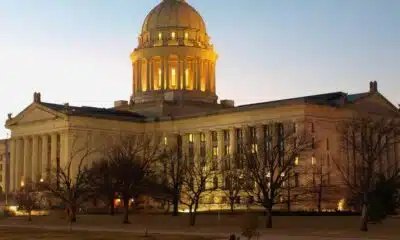News from the South - Louisiana News Feed
Closures of EPA’s regional environmental justice offices will hurt rural America, ex-employees warn
by Julia Tilton, The Daily Yonder, Louisiana Illuminator
March 25, 2025
Environmental justice efforts at the 10 U.S. Environmental Protection Agency (EPA) regional offices have stopped and employees have been placed on administrative leave, per an announcement from EPA Administrator Lee Zeldin earlier this month. Former EPA employees involved with environmental justice work across the country say rural communities will suffer as a result.
Before being shuttered in early March, the EPA’s environmental justice arm was aimed at making sure communities were being treated fairly and receiving their due protection under the Clean Air Act and Clean Water Act. Zealan Hoover, former senior advisor to the EPA administrator under the Biden administration, told the Daily Yonder that this work had big implications for rural places since there are pollution concerns in rural areas across the country.
“EPA was very focused on making sure that not just on the regulatory side, but also on the investment side, we were pushing resources into rural communities,” Hoover said.
According to Hoover, most of the pollution challenges the U.S. faces are not new. He said that the employees — now on leave — who staffed the EPA’s regional environmental justice offices were deeply knowledgeable on the issues affecting communities in their regions; issues which can go on for decades. Hoover said he worries about recent changes to the agency under the Trump administration, which also include a series of deregulatory actions and a proposed 65% budget cut.
“I trust that the great folks at EPA who remain will still try valiantly to fill those gaps, but the reality is that this administration is pushing to cut EPA’s budget, pushing employees to leave, and that’s going to restrict EPA’s ability to help rural communities tackle their most significant pollution challenges,” Hoover said.
GET THE MORNING HEADLINES.
One rural community that has faced years of environmental challenges is where Sherri White-Williamson lives in rural Sampson County, North Carolina. In 2021, the county’s landfill ranked second on the list of highest methane emitters in the U.S. The county is also the second-largest producer of hogs nationwide, and in 2022, it accounted for nearly 3% of all U.S. hog sales.
The hog industry is known for its pollution from open waste storage pits that emit toxic chemicals into nearby neighborhoods. For years, concerns about North Carolina’s hog industry have centered on the disproportionate harm that its pollution does to low-income communities and communities of color since hog farms frequently locate their operations adjacent to such communities in rural counties.
White-Williamson is also an EPA veteran. She worked on environmental justice initiatives at the agency’s Washington, D.C., office for over a decade before moving back home to southeastern North Carolina. She is now the executive director of the Environmental Justice Community Action Network (EJCAN), which she founded in Sampson County in 2020 to empower her neighbors amidst environmental challenges like those wrought by the hog farms and the landfill.
In her early work with EJCAN, White-Williamson said she noticed that conversations about environmental justice often centered on urban areas. Since then, White Williamson said she has focused on educating the public about what environmental justice looks like in rural communities.
“A lot of our issues have to do with what the cities don’t want or dispose of will end up in our communities,” White-Williamson said. “The pollution, the pesticides, the remnants of the food processing all ends up or stays here while all of the nice, clean, freshly prepared product ends up in a local urban grocery store somewhere.”
Another misconception about environmental justice, according to White-Williamson, is that it exists exclusively to serve communities of color. During her time at the EPA, White-Williamson said she spent time in communities with all kinds of racial demographics while working on environmental justice initiatives.
“I spent a lot of time in places like West Virginia and Kentucky, and places where the populations aren’t necessarily of color, but they are poor-income or low-income places where folks do not have access to the levers of power,” White-Williamson said.
When pollution impacts local health in communities without access to such “levers of power,” the EPA’s regional environmental justice offices were a resource—and a form of accountability.
Without those offices, it will be more difficult for rural communities to get the services they need to address health concerns, said Margot Brown, senior vice president of justice and equity at the Environmental Defense Fund.
“They’re dismantling the ecosystem of health protections for rural Americans, and by dismantling them, they’ll make them more susceptible to future hazards,” Brown said of the Trump administration’s decisions at the EPA. “It will impair health and well-being for generations to come.”
Brown worked at the EPA for nearly 10 years under President Obama and then under President Trump during his first administration. Her time there included a stint as deputy director of the Office of Children’s Health Protection. She, along with Hoover and White-Williamson, said that community members will likely need to turn to their state governments or departments of environmental quality in the absence of the regional environmental justice offices.
But White-Williamson noted that state governments, too, receive federal funding. Frozen funds across federal agencies and cuts to health care programs, including Medicaid, could wind up compounding challenges for rural communities trying to mitigate environmental health impacts.
“The communities that most need the assistance and guidance will again find themselves on the short end of the stick and end up being the ones that are suffering more than anybody else,” White-Williamson said.
Hoover described it as a “one-two punch” for rural communities. On the one hand, he said, rural places are losing access to healthcare facilities because of budget cuts.
“And on the other hand, they are also sicker because the government is no longer stopping polluters from polluting their air and their water.”
YOU MAKE OUR WORK POSSIBLE.
This report was originally published in the Daily Yonder. For more rural reporting and small-town stories visit dailyyonder.com.
Louisiana Illuminator is part of States Newsroom, a nonprofit news network supported by grants and a coalition of donors as a 501c(3) public charity. Louisiana Illuminator maintains editorial independence. Contact Editor Greg LaRose for questions: info@lailluminator.com.
This report was originally published in the Daily Yonder. For more rural reporting and small-town stories visit dailyyonder.com.
The post Closures of EPA’s regional environmental justice offices will hurt rural America, ex-employees warn appeared first on lailluminator.com
News from the South - Louisiana News Feed
Wagers on touchdowns, strikeouts and even penalties: States eye limits on prop bets
by Kevin Hardy, Louisiana Illuminator
September 9, 2025
As a bankruptcy attorney, New Jersey Assemblymember Dan Hutchison said he sees clients “all the time” whose betting on football and baseball quickly leads to missed car payments, delinquent mortgages and, ultimately, bankruptcy.
The rise of live, in-game bets — in which a gambler could place more than 200 individual bets during a baseball game if they wager on each pitch thrown — has only amplified his misgivings.
“And I’m like, are you kidding me? I mean, they’re betting on the next pitch, the next play, and it’s constant,” he said. “There’s no pause. It’s just not healthy.”
Worried that those bets can worsen problem gambling and threaten the integrity of sports, Hutchison, a Democrat, introduced legislation to ban New Jersey gambling licensees from offering live bets on individual plays during sporting events.
That bill illustrates growing state interest in regulating proposition bets, commonly called prop bets, a form of sports betting that is popular with fans but worrisome for sports leagues and state officials nationwide.
Unlike wagering on which team will win or the point spread of a game, prop bets can center on the performance of an individual player or even a single play that doesn’t necessarily affect the outcome of a contest. Prop bets can include trivia, such as the color of the Gatorade dumped over the Super Bowl’s winning coach, or specific stats, like how many touchdowns a certain quarterback will score during a game or which team will score first.
Critics say prop bets are easier for athletes to manipulate than the outcome of an entire game. They also make individual players more susceptible to online harassment from gamblers and increase the frequency of betting, thus raising the risk of addiction.
Ohio’s Republican governor has called for the nation’s first outright ban on prop betting on professional sports. Already, at least 15 states ban prop betting in collegiate sports, according to data maintained by the American Gaming Association, a trade group.
The heightened focus on prop bets comes amid a rapid rise of legal sports gambling, which is operational in 38 states and the District of Columbia. (Missouri plans to launch its new voter-approved program this December.) While legal betting has boosted state revenues and reshaped sports fandom, Hutchison said bankruptcy attorneys across the country are getting a preview of the financial wreckage it can wreak.
He said some clients are so distraught, he worries about potential suicides related to out-of-control gambling debts.
“That’s the reality of what’s going on. But they don’t make it seem like that when they’re doing these commercials during the football games: It’s normal, everybody does it, if you don’t do it, you’re not enjoying yourself,” he said. “That’s the glamour side of it. I deal with the other side.”
The industry’s rapid rise
The liberalization of sports gambling was made possible by a 2018 Supreme Court decision to strike down a federal law prohibiting gambling.
Since then, legal gambling has transformed the fan experience and propelled sportsbooks into major industry players: Americans are expected to wager an estimated $30 billion in legal sports betting on the NFL this season, according to the American Gaming Association. With so much money and energy flowing into gambling, academic researchers are increasingly raising concerns about the mental and financial consequences.
“The speed at which gambling has been marketed and legalized in this country is way faster than guardrails have been set to protect consumers and to try to give resources for problem gambling,” said Stephen Shapiro, a University of South Carolina professor who researches sports gambling.
Shapiro said a potential ban on prop betting in Ohio would prove a “big step” in gambling regulation. But he expects fierce opposition from the industry and consumers alike.
“They’re very popular. They’re arguably as — if not more — popular than betting on just individual games,” he said. “ … So I think there’ll be some backlash, but I also think over the next few years … there’s going to be an appetite for setting guardrails.”
The speed at which gambling has been marketed and legalized in this country is way faster than guardrails have been set.
– Stephen Shapiro, a University of South Carolina professor who researches sports gambling
The American Gaming Association, which represents casinos and sportsbooks, says that such restrictions would only drive gambling to illegal venues such as offshore betting platforms, where consumers have no protections.
But some sports leagues are ready for more restrictions on prop bets. The NCAA, the governing body for major college athletics, has been pushing federal and state leaders to ban prop betting in college sports.
The organization says 1 in 3 high-profile college athletes has received abusive messages from gamblers — the majority directed toward basketball players during tournament season. Just 12 days after North Carolina legalized sports betting last year — including prop bets on players — the University of North Carolina’s Armando Bacot reported receiving more than a hundred abusive social media messages for not accumulating enough rebounds in a game.
Women’s basketball student-athletes received about three times the number of threats as men’s basketball student-athletes, according to the NCAA.
In a March awareness campaign, NCAA President Charlie Baker said the abuse threatens the well-being of student-athletes and the overall environment of college sports.
“We need fans to do better,” he said in a statement at the time. “We need states to do better and ban player props that target student-athletes and enable detrimental abuse.”
And professional teams have their own concerns. Last month, ESPN reported the NBA and its players union supported further limits on certain prop bets. This summer, MLB Commissioner Rob Manfred told reporters he would like to see some limits on prop bets.
“There are certain types of bets that strike me as unnecessary and particularly vulnerable,” Manfred said, according to Yahoo Sports.
Ohio Gov. Mike DeWine wants to ban prop bets after gambling allegations against Guardians players
In late July, Ohio Republican Gov. Mike DeWine called on state regulators to outright ban all prop bets — a request he asked the professional sports leagues to support.
DeWine’s proposal followed the suspensions of Cleveland Guardians’ pitchers Luis Ortiz and Emmanuel Clase, who are being investigated by MLB. A sports betting integrity firm reportedly flagged two specific pitches Ortiz threw in early June that coincided with a pair of prop bets.
“The harm to athletes and the integrity of the game is clear, and the benefits are not worth the harm,” DeWine said in a July news release. “The prop betting experiment in this country has failed badly.”
The Ohio Casino Control Commission, which regulates sports betting, did not answer Stateline’s questions about the governor’s request. On Aug. 13, the agency said its investigation into the suspicious betting on the Guardians was ongoing.
In a statement responding to DeWine, the American Gaming Association said the Ohio incident is actually evidence that regulated gambling works: “It detects potential misconduct, it reports it, and it helps hold bad actors accountable,” said Joe Maloney, the association’s senior vice president of strategic communications.
In an interview, Maloney said eliminating legal prop betting will only move that activity into unregulated markets with no transparency. He said prop bets are a reflection of sports fandom: Bettors like to wager on their favorite players notching touchdowns or 3-pointers.
“It increases a fan’s engagement with the game they love, with the player they love. And so the idea that eliminating a legal betting market for someone really interested in increasing the level of engagement is going to prevent that activity, it’s just not the case,” Maloney said. “ … It simply will just move the activity into the shadows.”
Leagues endorse some limits
But the leagues are pushing for certain parts of the game to remain off-limits in legal betting markets.
Major League Soccer, for example, successfully pushed Illinois regulators last year to ban wagering on whether yellow and red penalty cards will be shown during a match and whether a specific player will receive a yellow or red card penalty.
Similarly, the state in February banned prop bets on NFL player injuries, player misconduct, officiating assignments, replay results and the first play of the game, following lobbying from the league.
Illinois Gaming Board spokesperson Beth Kaufman told Stateline the regulatory agency doesn’t maintain a list of specific prop bets that are allowed. But the board does require licensees to receive approval from the agency for specific wagers offered, she said.
“The IGB regularly monitors ongoing trends and developments in the industry and in major sports for any possible impact to the integrity of sports wagering in Illinois,” she said in a statement.
The NFL has pushed for similar rule changes in other states.
During a late August news briefing on gambling, David Highhill, the league’s vice president for sports betting, said the NFL has consistently objected to certain bets that raise integrity risks and provide limited fan engagement. Those include bets about officiating or player injuries and bets that are controllable by a single player on a single play.
“So things like ‘will this kicker miss a field goal’ are things that we’ve worked collaboratively across the board with operators to make sure those types of wagers are not offered,” he said.
In New Jersey, Hutchison said he doesn’t want to ban all sports betting or even all prop bets. And he knows his bill targeting so-called micro bets — those live, play-by-play bets — will face opposition, both from the industry and sports gamblers.
An avid sports fan himself, he said he doesn’t waste his money gambling on his beloved Philadelphia Eagles: “They don’t build all of those casinos in Atlantic City and Las Vegas because they pay out winners,” he said.
He said he’s not looking to end legal sports betting, but does think New Jersey needs to instill consumer protections and have a meaningful policy conversation about the societal costs of gambling.
New Jersey lawmakers are also considering a separate bill to ban player-specific prop bets on college sports.
The Council on Compulsive Gambling of New Jersey says it has experienced a nearly 300% increase in calls to its problem gambling hotline since the Garden State launched legal sports gambling in 2018.
In a July statement, Luis Del Orbe, executive director of the nonprofit council, which contracts with the state on gambling addiction issues, urged lawmakers to approve the bill to ban live, in-game bets. The organization says those high-frequency bets can trigger instant dopamine releases in the brain’s reward system, fostering compulsive behaviors that can lead to addiction.
“By limiting the proliferation of micro betting, this legislation takes an essential step toward protecting citizens from the harmful effects of reckless gambling practices,” Del Orbe’s statement said.
Stateline reporter Kevin Hardy can be reached at khardy@stateline.org.
This story was originally produced by Stateline, which is part of States Newsroom, a nonprofit news network which includes Louisiana Illuminator, and is supported by grants and a coalition of donors as a 501c(3) public charity.
Louisiana Illuminator is part of States Newsroom, a nonprofit news network supported by grants and a coalition of donors as a 501c(3) public charity. Louisiana Illuminator maintains editorial independence. Contact Editor Greg LaRose for questions: info@lailluminator.com.
The post Wagers on touchdowns, strikeouts and even penalties: States eye limits on prop bets appeared first on lailluminator.com
Note: The following A.I. based commentary is not part of the original article, reproduced above, but is offered in the hopes that it will promote greater media literacy and critical thinking, by making any potential bias more visible to the reader –Staff Editor.
Political Bias Rating: Center-Left
The content presents a balanced view on the issue of sports betting regulation, highlighting concerns about problem gambling and the social costs associated with certain types of bets, particularly prop bets. It features perspectives from Democratic lawmakers advocating for consumer protections and regulation, as well as industry representatives warning against overregulation. The article also references bipartisan actions, including Republican officials supporting bans on specific bets. Overall, the piece leans slightly left by emphasizing public health and regulatory measures but maintains a generally centrist tone by including multiple viewpoints and avoiding partisan rhetoric.
News from the South - Louisiana News Feed
Morning Forecast – Tuesday, Sept. 9th
SUMMARY: Tuesday morning starts cool with clear skies and temperatures in the upper 50s. A few clouds and isolated showers may appear in eastern parishes and parts of Mississippi but will remain outside the main area. The region will stay mostly sunny and dry through the weekend, worsening moderate drought conditions in Arkansas. Temperatures will rise steadily, reaching the upper 90s by the weekend due to a persistent upper-level ridge over the Southern Plains. High pressure will maintain dry air and stable conditions, limiting storms. Overall, expect sunny skies, dry air, and near-zero precipitation chances throughout the forecast period.
Skies remain clear this morning as temperatures have fallen to the upper 50’s, making for a nice and cool start for this Tuesday morning. A few clouds are possible for our eastern parishes in the MS River Valley as pop-up showers and storms will be possible across parts of Mississippi this afternoon but staying outside our coverage area. More clouds could linger into tomorrow but staying mostly sunny, nonetheless. The forecast looks to stay dry all the way through the weekend, which does not help in the current moderate drought conditions in Arkansas. Temperatures will also be on the climb pushing back to the upper 90’s by the weekend.
News from the South - Louisiana News Feed
Haynes’ defense blames DA Don Landry in bribery case
SUMMARY: Assistant District Attorney Gary Haynes faces multiple federal felony charges related to a bribery scheme involving Lafayette’s pretrial diversion program. His defense argues Haynes was a victim, duped by co-conspirators Leonard Franques and Dusty Guidry, who pleaded guilty and cooperated with prosecutors. Haynes allegedly lost $219,000 investing in Franques’ business, blaming District Attorney Don Landry for appointing him and hiring Guidry. Landry testified he brought Haynes back to manage the program due to a case backlog but denied involvement in wrongdoing. Prosecutors allege Haynes conspired for bribes and obstruction, facing up to 65 years if convicted. The trial continues with Landry’s cross-examination.
The post Haynes’ defense blames DA Don Landry in bribery case appeared first on thecurrentla.com
-
Mississippi Today7 days ago
Brandon residents want answers, guarantees about data center
-
News from the South - Texas News Feed5 days ago
Texas high school football scores for Thursday, Sept. 4
-
News from the South - West Virginia News Feed7 days ago
Missing man with dementia found dead
-
News from the South - Louisiana News Feed5 days ago
Portion of Gentilly Ridge Apartments residents return home, others remain displaced
-
News from the South - North Carolina News Feed5 days ago
Hanig will vie for 1st Congressional District seat of Davis | North Carolina
-
News from the South - Alabama News Feed5 days ago
Alabama state employee insurance board to seek more funding, benefit changes
-
The Conversation6 days ago
Scientific objectivity is a myth – cultural values and beliefs always influence science and the people who do it
-
News from the South - Oklahoma News Feed6 days ago
Oklahoma Unprepared for Looming Guardianship Crisis










































